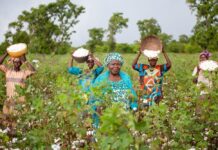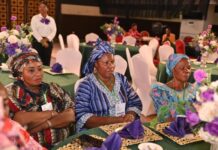After Malawi and other countries in the region experienced an extremely dry 2021/2022 agricultural season, the Government of Malawi and a coalition of partners, joined forces to manage the risk and reduce the impact on vulnerable populations.
As part of its ongoing engagement with the country, a delegation from the Africa Risk Capacity (ARC), an African Union (AU) Specialised Agency tasked with helping AU Member States plan, prepare and respond to extreme weather events, met with the Government of Malawi and civil society in Malawi last year. The meeting was an opportunity to strengthen ARC’s relationship with the Government of Malawi, build on the work done in the country over the years, understand the needs of the country, and share insights on what ARC can offer as part of its weather insurance for climate resilience offering. This, as part of a comprehensive engagement programme, led to Malawi participating in the ARC risk pool to cover its 2021/2022 agricultural season.
According to the ARC Group Director General Ibrahima Cheikh Diong, ARC sees it as essential to align its solutions to national policies and strategies such as the Malawi National Disaster Risk Financing Strategy. This will enable the government to optimise the use of any resources made available towards enabling response efforts in the event of a natural disaster to benefit the most vulnerable, including any payouts from an ARC insurance policy.
“As [the] ARC, our job is to understand, support and complement Malawi’s disaster risk policy framework – among other things,” he said, addressing the attending delegates. “In the process, we are also interested in promoting the equal treatment of women and girls who are often the most vulnerable when climate disasters strike.”
Not long after this meeting, in January 2022, the World Food Programme (WFP) released its Southern Africa Seasonal Monitor results that confirmed the first stages of drought conditions in the region’s 2021/2022 season.
The Seasonal Monitor showed the October-December 2021 period to have been the driest in a long time, or second driest, since 1981 across a spread of countries (from northern Mozambique and southern Tanzania, to southern Madagascar, the Angola-Namibia border and most of Malawi,). Fortunately, the WFP predicts that recovery will be possible, “provided abundant and regular rains are received from January onwards, and that there will be no early end to the rainfall season”.

The Seasonal Monitor has also revealed that: certain areas have received up to about 30 percent less rain than usual; monthly deficits have decreased as we entered 2022, but conditions remain drier than average; and delays in the availability of moisture for planting and early crop development have meant that the season was over five weeks late in kicking off.
In addition to close monitoring of rainfall performance as the season progresses, an assessment of the extent to which vulnerable households have been affected is necessary. As stocks of certain staples become increasingly depleted, food prices are rising to accommodate transport costs to bring it in.
Taking his turn at the podium during the meeting, the Civil Society Network on Climate Change (CISONECC) national coordinator, Julius Ngo’ma, spoke on behalf of non-state actors under the banner of Multi-Actor Partnership (MAP).
While the government is the best source of information on exactly where any aid is most needed, “MAP brings together civil society, policy makers, the private sector, researchers and the media for a joint effort on pro-poor and human-rights-based approaches to climate and disaster-risk financing and insurance,” advised Ngo’ma.
In this regard, as part of the ARC Replica programme, an initiative that allows humanitarian actors to take out insurance on behalf of a country, the WFP remains a crucial cog in advocating for better risk-management systems and funding related to climate-change effects. In November last year, following a drought and pests that destroyed significant volumes of crops, up to 65,000 Malawian farming households received cash payouts amounting to US$2.4 million from a UN WFP agricultural insurance programme.
“Most farmers in Malawi rely on rain-fed agriculture but with the surging effects of climate change, livelihoods are cyclically disrupted and this fuels hunger,” said the Malawian Minister of Agriculture, Lobin Lowe, who attended the payout launch. “Scaling up crop insurance can enhance people’s capacity to anticipate and withstand shocks, and [can] mitigate their effects in the long run,” he enthused.
Says Lesley Ndlovu, ARC Limited CEO: “Agriculture is extremely important to African countries as it contributes one third of GDP and two thirds of employment opportunities and when you think about natural disasters they have the greatest and most disproportionate impact on small to medium scale farmers and in Africa currently 80%-90% agricultural output comes from these types of farmers.
“Parametric insurance accelerates the speed of pay-out because we can run the model quickly and pay out a claim to a farmer within weeks, allowing them to bounce back and continue investing in their farms.”
During the 2020-2021 farming season, farmers insured crops such as maize, sorghum, rice, groundnuts, pigeon peas and cotton to protect their income from harvest losses.
“With the changing climate, farming can be an uncertain business in Malawi, especially for smallholder farmers,” says Paul Turnbull, WFP Malawi Country Director and Representative. “Payouts are a springboard for farmers to continue their efforts in adapting to increased weather-related shocks, and in fighting both food insecurity and poverty.”
The ARC Group comprises ARC Agency, a specialised agency of the AU, and ARC Ltd, the financial affiliate of the Group. Together, the organisation supports AU member states to plan, prepare and respond to the negative effects of climate change.
[sources]
- https://www.nepad.org/news/arcs-weather-insurance-under-spotlight-malawi
World Food Programme (WFP)’s Southern Africa Seasonal Monitor, January 2022 - https://www.un.org/africarenewal/magazine/november-2021/farmers-malawi-receive-cash-one-largest-insurance-payouts-africa










[…] Get Original Links Here🡽 […]
[…] Get Original Links Here🡽 […]
[…] Get Original Links Here🡽 […]
[…] Get Original Links Here🡽 […]
Comments are closed.